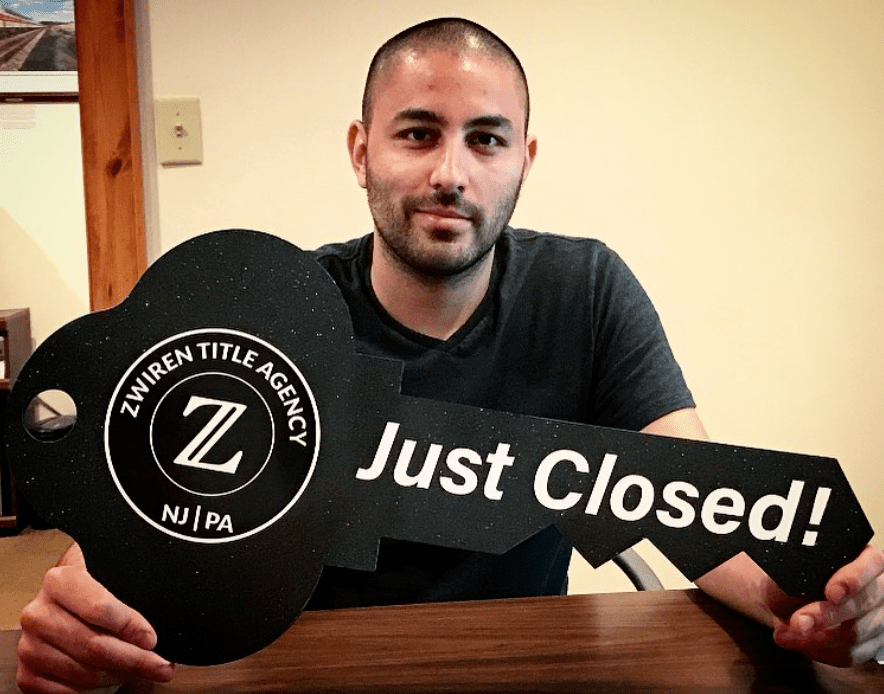Title commitments and other reports performed prior to closing provide key information necessary to get through a transaction successfully. Information about the land records, tax and assessment data, judgments, tidelands, corporate status and reviews of prior court matters involving the property give the buyer and counsel an opportunity to make sure new ownership is clear and as expected.
When lending money to a property owner, a lender needs to know they will be in first lien position. Title insurance provides lenders the comfort they need in order to assure the loan is properly collateralized.
Have your Closing at Zwiren Title's Office
Our conference room is dedicated to hosting closings for our clients. It is equipped with a wall-hanging monitor and webcam to allow attorneys to attend their client's closings remotely, via video conference. We look forward to hosting your closing!

Closing Photo Gallary


















Closing Photo Gallary
What Does a Title Company Do?
What is a title?
When you purchase a home, you are really purchasing the title to the property. A title is the evidence, of right, that a person has to the ownership and possession of land.
It is possible that someone other than the owner has legal right to the property. That title may be contested based upon past rights and claims asserted by others. If that right can be established, this person can claim the property outright or make demands on the owner as to its use. These types of claims can infringe upon your purchase of the property or cause you to lose money.
What does a title company do?
Think of a title company as the final stop on the road to a real estate or financing settlement. We oversee the interests of all parties: buyers, sellers, lenders, real estate agents, and attorneys; and coordinate the transfer of money. Prior to settlement, the title company will research the ownership history of the property to determine what is required to reach the parties goals. At the settlement table, the title company collects and distributes funds from the transaction, facilitates the transfer of ownership of the property, and binds title insurance. We have fiduciary responsibilities to all parties in a transaction and may only proceed forward when all parties come to an agreement.
What is a title search?
A title search is a detailed examination of the historical records concerning a property. These records include deeds, court records, property and name indexes, and many other documents. The purpose of the search is to verify the seller's right to transfer ownership and to discover any claims, defects and other rights or burdens on the property.
A title insurance policy is purchased at the time of the closing to assure the buyer that he or she has purchased a valid title.
What is a chain of title?
The chain of title is simply the history of ownership of a particular tract of land, revealing who and when the property was bought and sold. This information is obtained from the County Clerk’s Office or by the computerized plant maintained in the offices of Zwiren Title Agency, Inc.
What issues can a title search reveal?
A title search can reveal any party that might have interest in the property as well as a number of title defects. liens, and other restrictions. For example, things like outstanding taxes, unsatisfied mortgages, and judgments against any recent owner. Additionally, an extensive search can reveal any restrictions on how the land may be used.
What is a survey?
A survey is a geographical description that provides a tangible representation of the property. It sets out the boundaries, dimensions and area of the property. If there are improvements on the property, a survey also locates the improvements and often identities access to and from a public road. The lender and/or Title Company may require a new survey if your survey is considered old or does not locate your improvements on the property. Typically surveys on residential properties do not provide a plotting of easements and restrictions, unless it is specifically requested of the surveyor. However, commercial surveys often reference and plot the easements and restrictions showing in the records when the lender requires them to do so.
The title company does not insure the survey. Rather, it uses the survey as a tool to identify the matters set forth on the land that impact the title or the title insurance coverage. The title company must approve the survey in order to agree to remove the broad survey exception from the title policy and replace the exception with a survey endorsement.
What are the itemized charges often seen on a title invoice? Title Examination: A title examination is a fee per parcel of land reviewed. This fee amount is fixed by the Department of Insurance and does not vary.
Endorsement: An endorsement is additional insurance coverage added to the loan policy that is required by the lender in each transaction specific. Most lenders request at least 3-4 endorsements. Most residential endorsements are $25 each (i.e. ALTA 6 Variable Rate, which lenders ask for when your mortgage is not fixed)
Upper Courts/Patriot Name: An Upper Court/Patriot Name is a judgement search on the names in title. We usually anticipate 4-6 names to be ran; buyer, seller, and owners for the previous 20 years. In the case of a purchase the sellers names are also run (husband, wife and wife’s maiden name and any previous owners within 20 years). The Patriot Name Search is another name search based on the Patriot Act. Zwiren Title Agency, Inc. charges exactly what we are charged by the search vendor.
Tax and Assessment Search: A tax and assessment search that shows the status of property tax and assessment fees. This will be exactly what we pay for the report.
Notice of Settlement: A Notice of Settlement is a document that is required to be filed in order to give notice of the transaction. It requires a filing fee for the county clerk to report.
Tidelands Search: A tidelands search of maps is performed to see if there is or once a navigable waterway that run through the property, which is claimed to be owned by the State of New Jersey.
What is title insurance?
When you buy a property, you are given the deed to the property. That generally means you receive full legal ownership, but sometimes there are other rights or restrictions in a prior deed, will, mortgage, easement or other documents in the records that may give someone else a valid legal claim against your property.
Title Insurance is a contractual agreement between a property owner and/or a lender and the title insurance company. The policy ensures a new owner and/or lender that the title is free and clear of any possible encumbrances, except what is excepted or excluded. It also insures protection for the new owners and lenders against loss or damages if defect is found in your title, such as back taxes, undiscovered liens, legal judgments, forged deeds, mistakes in public record and a host of other potential legal/financial problems that can arise when purchasing or refinancing a property. A thorough search of the records will reveal liens, claims or encumbrances that affect the property.
The two basic types of title insurance policies are the Owner's Title Policy which insures the owner, and the Loan Title Policy which insures the lender or mortgagee.
The lender's title insurance, however, does not protect the new buyer of the property. Although the land is the same, the interest of the buyer and the interest of the lender are very different. The provisions of a lenders title insurance are different from those of an owner's title policy, so the owner must obtain an owner's title policy to be covered, often issued simultaneously with the lender’s title policy.
What is a commitment for title insurance?
Upon completion of a county land record search and other relevant searches, a commitment for title insurance is produced to reveal the collected information, how it impacts the title, and what is required to meet the Insureds' goals. The buyer and seller and the mortgage lender proceed with the closing of the transaction after clearing up any defects in the title and meeting other relevant requirements.
The mortgage lender is as concerned as the buyer about the quality of the title because the property is to be security for the new mortgage loan. The mortgage lender requires insurance that it has a valid first (or another acceptable priority) mortgage lien on the property. This is not only common sense, but generally is a legal requirement of regulated mortgage lenders.
Schedule A of the commitment for title insurance sets forth the proposed transaction including the purchaser and/or borrower, vested owner, estate of title, and description of property being purchased or used for obtaining a loan.
Schedule B-I sets forth requirements that must be met at or before closing (i.e. payment of outstanding liens or taxes).
Schedule B-II sets forth any restrictions and exceptions such as easements or oil leases, etc. These effect the property and will be shown as an exception to the policy issued after closing.
Schedule C or A-4 provides the legal description of the property.
When do I purchase title insurance?
The title insurance policy is purchased at closing for a one-time premium, based upon the loan amount and/or purchase price. However, the preparation that leads to the title insurance policy being issued begins in the very early stages of the closing process. Your closing specialist will determine the best time to order your title search.
Are insurance policies the same from company to company?
Title insurance companies offer industry “standard" title policies adopted by the American Land Title Association (ALTA) or any individual state’s land title association. You can be assured that the policy protection is a Zwiren Title Agency, Inc. policy is identical to that of our competitors.
Do I need title insurance?
Most definitely! Title insurance is a means of protecting yourself from financial loss in the event that problems develop regarding the rights to ownership of your property. There may be hidden title defects that even the most careful title search will not reveal. In addition to protection from financial loss, title insurance pays the cost of the of defending against any covered claim. Although highly recommended by experts, you do not have to purchase title insurance if the buyer is paying cash for a home. The vast majority of banks and other mortgage lenders require that the borrower obtain a lender’s policy of title insurance equal to the loan amount.
However, title insurance companies will not insure titles known to be bad or defective.
Why is title insurance needed when refinancing a mortgage loan?
Why do you need to buy title insurance again — because a separate policy is needed by the lender, insuring the validity of your mortgage when it is made. The prior policy doesn’t provide protection against events that may have transpired between the time you took out your existing mortgage and when it is refinanced.
For example, you may have taken out a second mortgage on the home that could threaten the priority of the new lender’s mortgage. Or, there could be judgments against you or a mechanic’s lien against the property by a supplier who wasn’t paid for home improvements.
Lenders also insist on a new title policy because many mortgages are packaged as securities and sold to investors in the secondary mortgage market. Title insurance is the common practical way to provide the assurance to investors who require confirmation that the mortgages backing these securities are valid and enforceable.
Do I have to use the title insurance company recommended by my attorney, lender or realtor?
No, you have the right to choose your own title insurance company. In certain geographical areas, the attorney interacts with and relies on the title insurance company, so it might be natural for them to request you to work with the company whose practices and procedures they are familiar and comfortable with.
What risks are covered by title insurance?
Coverage typically protects against hidden risks such as:
• Forgery and impersonation;
• Lack of competency, capacity or legal authority of a party;
• Deed not joined in by a necessary party (co-owner, heir, spouse, corporate officer, or business partner);
• Undisclosed (but recorded) prior mortgage or lien;
• Undisclosed (but recorded) easement or use restriction;
• Erroneous or inadequate legal descriptions;
• Lack of a right of access; and
• Deed not properly recorded.
• NOTE: Title does not cover items relating to certain laws, regulations or ordinances, such as subdivision, environmental and municipal, except in limited requested circumstances.
Fees may vary from company to company. If requested, a title company will supply you with an estimate of fees and the cost of title insurance, prior to settlement.
What fees are charged for closing services?
Notice of Settlement: A filing fee from the county clerk to report a Notice of Settlement. This is a document that is required to be filed in order to give notice of the transaction.
Settlement Fee: A fee to handle the closing, where we would act as your closing agent. We would handle the disbursements of funds along with any other closing services. This is a regulated fee and is based on a range. The price is determined by what time of day the closing takes place.
Government Recording Fee: This is the fee the county charges to record the new mortgage. They base the amount on the number of pages per document. This fee will adjust the pages of the mortgage change. If we overestimate and the recording amount is less than we collect, a refund will be sent to you for the excess.
Wire: This is a fee to process any incoming or outgoing wires that are necessary for the transaction. This fee is charged to us by our bank and we charge the same fee. We always anticipate 2 wires, one incoming wire from the lender and one outgoing wire to pay off your existing mortgage. If there are no wires, then we do not charge.
Are there anymore charges that could pop up?
